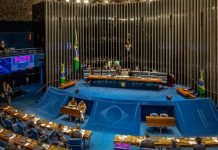As Brazil seeks to go legal on the gambling front, what can policy makers there do to achieve a robust regulatory framework that will keep gambling fair, transparent and crime-free? SBC Americas posed that question to Becky Harris, chairwoman of the Nevada Gaming Control Board, who attended the recent Brazilian Gaming Congress in Sao Paulo to share her experience of gaming legislation in one of the most well run jurisdictions in the world.
Brazil seems to have several issues to address before it can go ahead with legalisation, but what do you see as being the biggest hurdle to overcome?
Brazil needs to identify and involve the various stakeholders with an interest in legalised gambling; both those who support the effort as well as those who oppose it. Vigorous discussion of the many issues Brazil faces will help decision makers find consensus and build a robust regulatory framework. Brazil needs to implement a regulatory structure that works there. Once developed, the gaming environment is constantly changing and new issues will emerge.
It is vital that the regulatory structure allows for these issues to be dealt with fairly, efficiently and effectively. Nevada has a model that works, and one of the critical elements that allows for our successful regulatory environment is flexibility. The emerging issues can range from a new technology for slot machines to changes in laws completely separate from the gaming industry, which indirectly have an impact. Nevada’s regulatory structure allows it the Board to make effective regulatory changes in a timely manner.
Nevada’s Public Policy on Gaming is a profound testament to how we regulate gaming. Our gaming regulatory decisions reflect these public policy mandates. Nevada Revised Statute 463.0129(1) provides a summary of the public policy of Nevada regarding gaming. Specifically,
(a) The gaming industry is vitally important to the economy of the State and the general welfare of the inhabitants.
(b) The continued growth and success of gaming is dependent upon public confidence and trust that licensed gaming and the manufacture, sale and distribution of gaming devices and associated equipment are conducted honestly and competitively, that establishments which hold restricted and non-restricted licences where gaming is conducted and where gambling devices are operated do not unduly impact the quality of life enjoyed by residents of the surrounding neighbourhoods, that the rights of the creditors of licensees are protected and that gaming is free from criminal and corruptive elements.
(c) Public confidence and trust can only be maintained by strict regulation of all persons, locations, practices, associations and activities related to the operation of licensed gaming establishments, the manufacture, sale or distribution of gaming devices and associated equipment and the operation of inter-casino linked systems.
(d) All establishments where gaming is conducted and where gaming devices are operated, and manufacturers, sellers and distributors of certain gaming devices and equipment, and operators of inter-casino linked systems must therefore be licensed, controlled and assisted to protect the public health, safety, morals, good order and general welfare of the inhabitants of the State, to foster the stability and success of gaming and to preserve the competitive economy and policies of free competition of the State of Nevada.
(e) To ensure that gaming is conducted honestly, competitively and free of criminal and corruptive elements, all gaming establishments in this state must remain open to the general public and the access of the general public to gaming activities must not be restricted in any manner except as provided by the Legislature.
“…the importance of public trust and confidence in the gaming industry, specifically regarding the operation of games and devices is vital.”
When it comes to establishing a regulatory framework, what is the most important consideration for Brazil as it looks to go legal?
When establishing a regulatory framework, the importance of public trust and confidence in the gaming industry, specifically regarding the operation of games and devices is vital. Additionally, the industry must be free of all criminal and corruptive elements in order to ensure that gaming is conducted honestly.
In Nevada’s regulatory framework there are six separate divisions within the agency which are responsible for various aspects of gaming regulation, all of which are extremely important to the mission of the Board which is protecting the integrity and stability of the industry through in depth investigative procedures, exacting licensing practices, strict enforcement of laws and regulations holding gaming licensees to high standards.
However, an effective regulatory structure requires a strong enforcement and Investigations division. The Board’s Enforcement Division operates 24 hours a day, seven days a week and their primary responsibilities are to conduct criminal and regulatory investigations and to arbitrate disputes between patrons and licensees. Meanwhile, the Investigations Division is charged with investigating all individuals and companies seeking a privileged Nevada gaming licence, registration, finding of suitability or other approval. Although not more important than other divisions, their responsibilities are critical to the Board’s success.
What was your lasting impression of the Brazilian Gaming Congress – what did you take away from the event?
It is always extremely helpful to engage in a public dialogue with a variety of stakeholders, express different points of view and have conversations on an assortment of complicated issues. The event was extremely helpful and productive, I was impressed with the stakeholders who participated. They ranged from industry representatives, leaders from several municipalities and multiple levels of government including the Deputy Ministers. The people of Brazil were very hospitable and I was so appreciative of their efforts. I also look forward to forming lasting relationships with the people I met there.














